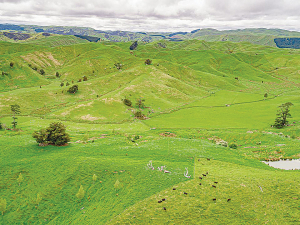Replacing farms with forests?
A horror story - that’s how Federated Farmers describes new research looking at forestry conversions’ impact on water quality.
 The usual measure to economics of farming need to be expanded to fully understand the costs and benefits of regenerative agriculture practices in New Zealand, says a new report out today.
The usual measure to economics of farming need to be expanded to fully understand the costs and benefits of regenerative agriculture practices in New Zealand, says a new report out today.
The usual measure to economics of farming need to be expanded to fully understand the costs and benefits of regenerative agriculture practices in New Zealand, says a new report out today.
The report, Determining the economic and market potential of regenerative agriculture, highlights the need to improve the way we value environmental stewardship, which would provide more balanced economic understanding of all farms in New Zealand.
“We need to broaden the way we value our food production systems,” says one of the report authors, Distinguished Professor Caroline Saunders, director of Lincoln University’s Agricultural Economics Research Unit (AERU).
“Economics can help us assess a wider range of value from agriculture, to include its effect on society, culture and the environment.”
Regenerative farm management systems may have environmental benefits for biodiversity, water quality, and the reduction of greenhouse gas emissions, says the report. Accounting for environmental impacts, both negative and positive, could provide a useful approach for fully measuring the impact of the adoption of regenerative agriculture for New Zealand.
Agricultural businesses in New Zealand have often been criticised for not accounting for the full environmental costs of their products. A report from the Environmental Protection Authority released last week highlights agricultural companies carry the country’s biggest burden of greenhouse gases. In 2014, the costs of the negative environmental impact of the NZ dairy industry were estimated to exceed the 2012 dairy export revenue of NZ$11.6 billion.
The report also highlights the potential for regenerative farmers to access new and emerging financial benefits. These include carbon and biodiversity credits, ‘green finance’ from financial institutions (in which terms are tied to environmental or social goals), and transition finance (through private investment such as Calm the Farm, for example).
‘Regen ag’ is a sustainability trend that is likely to move at different paces internationally, says the report, which suggests methods to assess the possible value of regenerative agriculture in different markets. Recent market studies found that approximately 40% of New Zealand’s potential food customers in California and the UK are aware of regenerative agriculture, and associate ‘regen’-farmed food with reduced environmental impacts and improved animal welfare.
“These qualities have potential to help New Zealand agribusinesses generate more value for our food exports. There could be potential to generate a premium, protect market share, or further strengthen New Zealand’s food reputation,” says Saunders.
“The commercial success of regenerative agriculture will depend on the prices that farmers can get for their products, especially overseas.”
The report is one of three new reports out today that provide an overview of how to assess the impact of regenerative agriculture on farm businesses. The reports look at how New Zealand agribusinesses could determine whether the adoption of regenerative agriculture practices might increase the quality or quantity of their produce, or the profitability of their business.
The three reports were produced by a research project funded by the Our Land and Water National Science Challenge, the NEXT Foundation and Manaaki Whenua – Landcare Research. The project has produced 20 reports being released through November, each providing recommendations for how claims regarding specific possible benefits of regenerative agriculture could be tested in Aotearoa New Zealand.
Federated Farmers is celebrating following the Government's announcement that young farmers will be able to use their KiwiSaver funds to buy their first home or farm.
The Meat Industry Association of New Zealand (MIA) today announced that Chief Executive Officer Sirma Karapeeva has resigned from the role.
The winners of the 2026 Hawke’s Bay/Wairarapa Dairy Industry Awards were announced at the annual awards dinner held at Copthorne Solway Park in Masterton on Thursday evening.
Environment Southland is welcoming this week’s decision by the Environmental Protection Authority (EPA) to approve the release of Blaptea elguetai, a leaf‑feeding beetle that will help control the highly invasive Chilean flame creeper.
This March, the potato industry is proudly celebrating International Women’s Day on 8 March alongside the International Year of the Woman Farmer, recognising the vital role women play across every part of the sector — from paddocks and packhouses to research, leadership, and innovation.
Fruit trader Seeka posted a record profit and returns to shareholders in 2025.

OPINION: A mate of yours truly reckons rural Manawatu families are the latest to suffer under what he calls the…
OPINION: If old Winston Peters thinks building trade relations with new nations, such as India, isn't a necessary investment in…